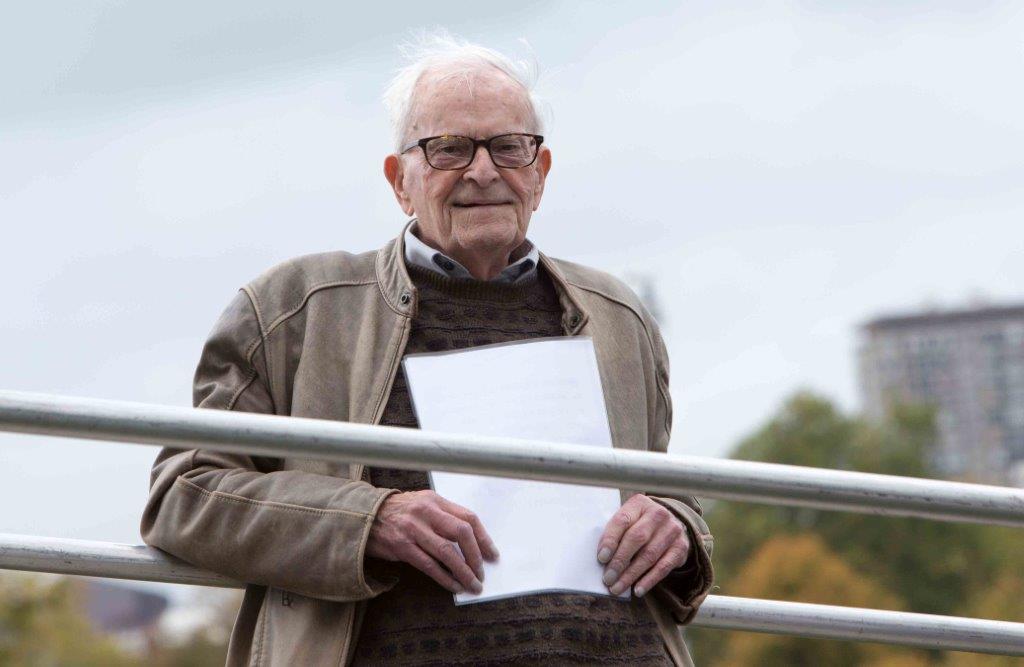Love among the ruins
Harry Leslie Smith has published his latest memoir at a time when the world is witnessing the most devastating refugee crisis since the Second World War.
Love Among the Ruins, although centred on his life with his late German wife Friede, is set against a backdrop of rations, mass starvation, a destroyed city and desperate German civilians. This memoir brings home the fact that, less than seventy years ago, the whole of Europe was suffering what the refugees are now suffering today.
In the aftermath of World War II, the world and Europe agreed a plan to help our friends as well as those who had actually been our enemies. Germany is once again at the heart of the refugee crisis, both in this book’s original context and the current context, but in a completely different way.
We are fortunate that Leslie Smith’s memoir is a timely reminder of our ability to be humane and moral.
Leslie Smith’s success as a political activist, writer and author of acclaimed Harry’s Last Stand, has stemmed from the integrity he carries with his political views and vision as well as his ability to use his own personal experiences to shed light on current situations. Although presented more subtly than in his last book, this memoir is yet another example of this skill he possesses.
Often war memoirs start at the beginning of the war, yet Leslie Smith chooses to begin his after World War II, when his life with his soulmate Friede began. Although it may seem he is beginning with the end, this is where he believes his life truly began — when he met Friede.
Set against a backdrop of destruction, the pair is able to become emotionally and physically entwined in a romance which goes against society’s judgments and perceptions. Harry is in the RAF, which helped bomb German cities into the ground under the leadership of â€Bomber’ Harris. Friede and her family were these bombings’ victims.
In 1943, in one bombing raid alone, 80,000 civilians were killed or injured. This raid – Operation Gomorrah – set off the first â€firestorm’ caused by bombing. Hamburg was a major industrial centre and home to U-boat pens, shipyards, fuel depots and a centre for arms manufacture.
In the wasteland that was Hamburg, Harry and Friede persevere through the many hurdles they face: rations, being exploited by employers, being forbidden to marry, and being forced to move country with the RAF. There is no defining point when Harry falls in love with Friede, but it seems love at first sight may exist, even if it is in a black market in a war-torn German city.
He writes in a way which allows the reader to be able to see, smell, hear, taste and feel the city of Hamburg and the destruction and austerity which encompassed it. Yet he also allows hope and love to seep through the ruins, just as the title suggests.
Harry Smith describes, in austerity-ridden Hamburg, the attitudes and behaviour of his fellow RAF comrades towards the refugees, particularly how they took advantage of the desperate and vulnerable girls.
Although he admits to initially being “emotionally detached” from the begging and starving Germans, Friede opens a window for him to become more compassionate.
He risks his job and livelihood by stealing from RAF supplies to provide food and medicine for her family and refuses to accept the common misconception that all Germans were Nazis. Instead he adopts the attitude that they were in fact human beings who were just as destroyed by the Nazi regime as Britain and its allies, if not more so.
Indeed, underlying his accounts is a deep compassion for a homeland and society which was not long before his enemy.
“My black and white opinions about Germany changed when I crossed through their borders and encountered a civilisation turned into a wasteland by aerial bombardment,” he writes.
A particularly cutting paragraph is his description witnessing when a sick and exhausted horse dragging a cart collapses in the street. The owners did not rush to its side or show remorse at its loss but instead left it to the people of Hamburg to run out of their houses and up the street to cut chunks of it off to eat.
Even though set in appalling circumstances, Harry’s memoir will not make the reader despair. Among the ruins, the human spirit prevails.
There is something humorous and light-hearted, too, in many of the passages. In his opening note to the reader he tells us, “Some say age brings wisdom, reason, serenity. I say bollocks: great age brings rheumatism, deafness, vascular degeneration and organ failure.”
While Friede is treated like an alien when tested to see whether she can marry Harry – and misjudged by his own mother – he stands by her and the reader is left knowing that this union, which has survived prejudice, starvation and destruction, will surely endure.
Although Leslie Smith covers a range of issues in his latest memoir — refugee crises, post-war austerity, despair, young love and passion, optimism in a pessimistic time and place — his overlying message seems to be that love, compassion and friendship are what ultimately matters, and what makes the world go round.
Smith has given us many valuable messages through his writing, but perhaps this is the most important one.
Love Among The Ruins by Harry Leslie Smith will be published on September 10 by ICON BOOKS priced ÂŁ8.99
 Like
Like Follow
Follow


